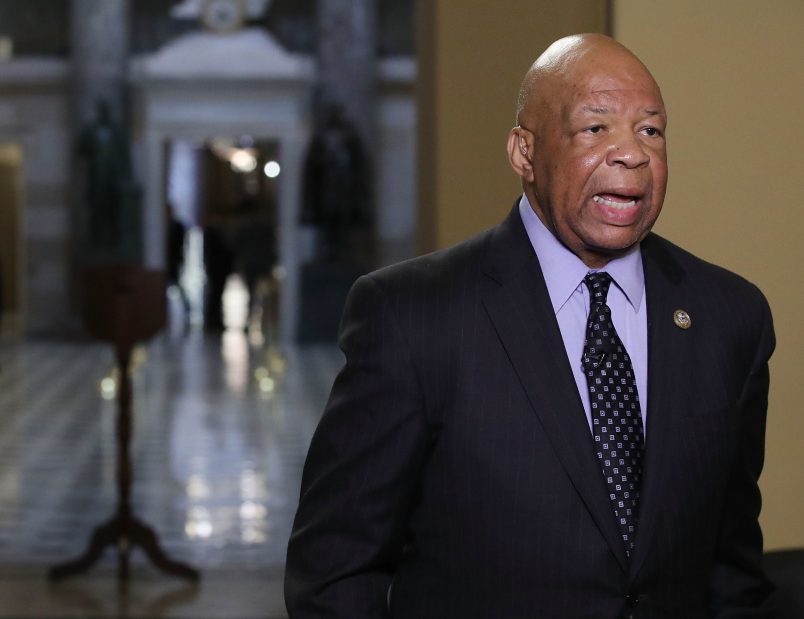The House Oversight Committee on Wednesday approved of a resolution recommending that Attorney General Bill Barr and Commerce Secretary Wilbur Ross be held in contempt for not complying with subpoenas in the committee’s census citizenship question probe.
The 24-15 vote came some six hours after the meeting to consider that measure started. Rep. Justin Amash (R-MI) joined Democrats in voting in favor of the resolution.
As the committee meeting was getting underway, the Justice Department announced that President Trump had asserted executive privilege over the documents the committee was demanding.
Among the materials the committee subpoenaed are key internal documents from the period when the Trump administration was working with the Justice Department to craft a formal request to add the question to the 2020 census. The justification put forward in the request — that it would enhance DOJ Voting Rights Act enforcement — has been called pretextual by three federal courts, and there is ample evidence the administration had partisan reasons for including the question on the census.
“We know that this was a pretext,” Committee Chairman Elijah Cummings (D-MD) said at the beginning of Wednesday’s meeting.
“We have been blocked from fully determining the real reason the administration sought to add the citizenship question,” Cummings said.
In a statement after the vote, Ross called the vote an “empty stunt” and accused he committee of “flagrant political posturing.”
“No matter how much the Department and I cooperate and provide information, the Committee will always twist the facts to suit their own ends,” Ross claimed.
Republicans on the committee dragged out the meeting with debates on a half dozen amendments, which were ultimately voted down, and with complaints that Cummings violated committee rules by not giving enough notice for the contempt vote.
They accused Democrats of seeking to influence the Supreme Court — which will ultimately decide whether the question stays on the census — as it considers its ruling in the case. They defended the administration’s move to add the question. And they claimed the administration had not been stonewalling the committee, pointing to the few officials that were made available for interviews, in addition to thousands of documents the administration has produced.
Democrats countered that many of those documents were heavily redacted or were already public, and that the witnesses had been instructed by agency attorneys not to answer several of the committee’s questions.
“This begs the question: what is being hidden?” Cummings said of Trump’s move Wednesday to assert executive privilege.
Wednesday’s contempt vote was the latest flashpoint in the war between House Democrats and President Trump over the authority of Congress to conduct oversight of his administration.
The Judiciary Committee previously recommended that Barr be held in contempt for his refusal to turn over certain materials related to special counsel Robert Mueller’s investigation. However, House Democrats on Tuesday stopped short of holding him in contempt on the floor. Instead, they passed a measure that authorized the filing of lawsuits to force him and former White House counsel Don McGahn into complying with the Judiciary Committee’s subpoenas.
The measure also allowed committee chairs, with leadership’s OK, to file similar court petitions to enforce other subpoenas without first going through the step of a floor contempt vote.
It is unclear if and when Cummings will seek to do so when it comes to his census probe subpoenas.
Cummings told reporters after the vote he would be “consulting” with House leadership about where the committee goes from here, but the chairman would not say whether he would take the administration to court over the subpoenas.
Among the documents sought in the subpoenas are drafts of the formal DOJ request for the citizenship question, and a secret memo that was provided to the request’s author, John Gore, by the Commerce Department as he was working on it.
Additionally, the committee demanded unredacted versions of emails Ross sent to aides well before the DOJ request pressuring them to get the question added.
The committee also subpoenaed Gore, a top DOJ official, for testimony, after he refused to answer several key questions during a voluntary interview. Barr ordered that Gore not testify because the committee was refusing to let a DOJ attorney join him for the deposition.
Amash was also the only Republican to support the subpoenas.
If the committee does ultimately obtain the testimony and documents it seeks, it will likely be after the Supreme Court decides the case in a ruling that is expected by the end of the month.
Nonetheless, the information could shed light on who in the administration knew what about its real reasons for adding the question. The challengers in the case have unveiled recently-obtained evidence that a key player in the administration’s push for the question, a now deceased GOP gerrymandering guru, had previously advocated for it for the purposes of boosting Republicans’ electoral advantages.
The question stands to diminish the political representation and government resources allotted to to more diverse, urban regions of country by discouraging immigrant communities from participating on the census.
It is also almost guaranteed that some red states will try to use the data that the question produces to fundamentally change the redistricting process. Non-citizens would be excluded from the count used to determine how districts are drawn, shifting political power to whiter, more rural regions of the country.






